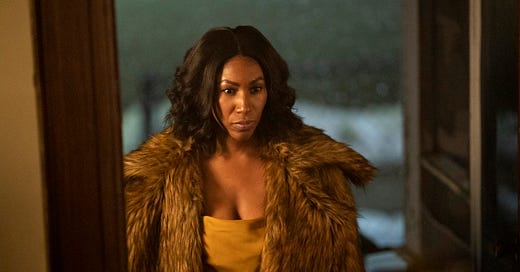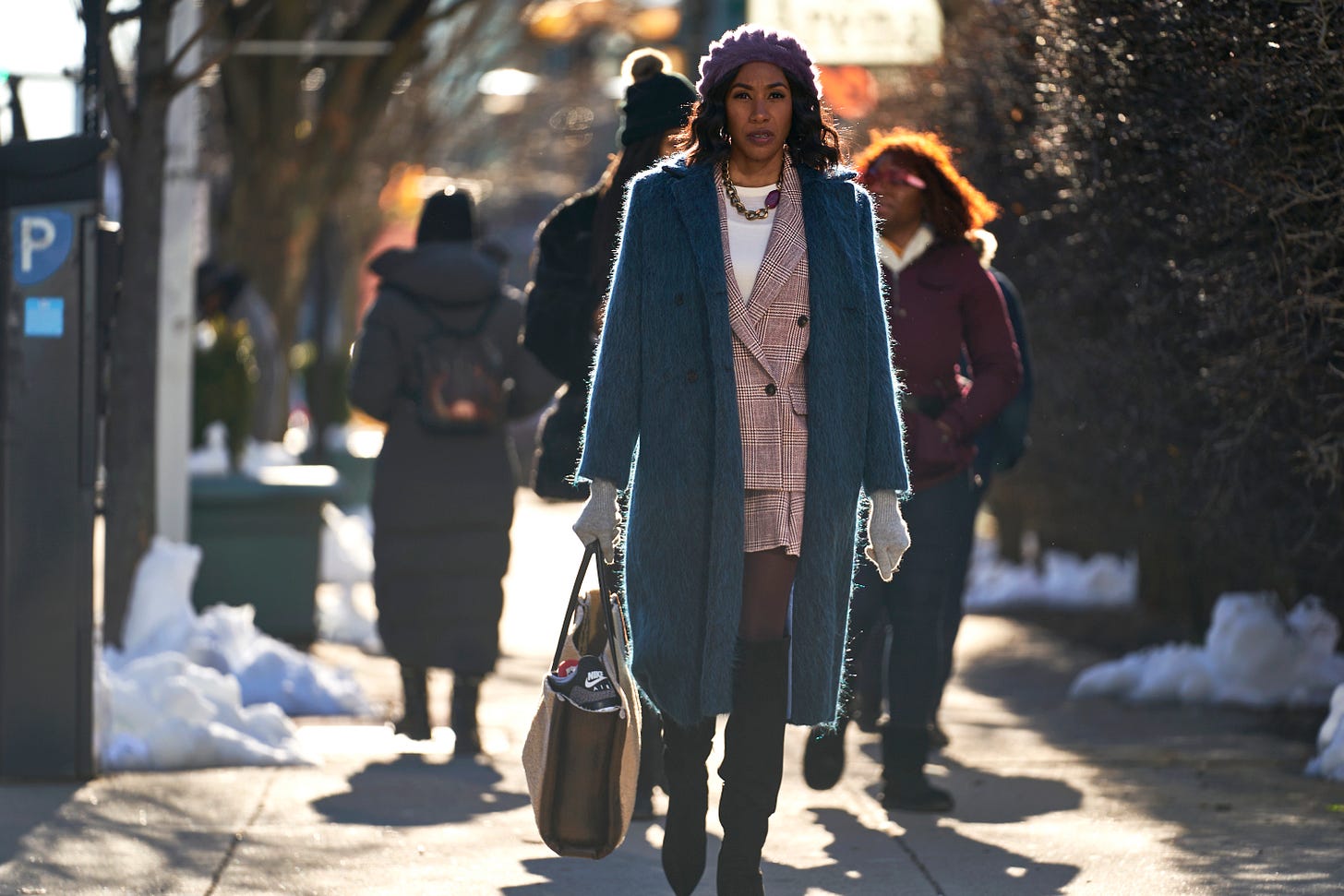Diarra Kilpatrick Is Just Fine With Defying Labels With Her 'Diarra From Detroit' Series
Premiering March 21, the BET+ series promises laughs, drama and a nail biting mystery.
One final reminder to fill out the Coffee, TV & Me survey if you haven’t already. It won’t take long and can be found right here. (If you tried previously and had a technical issue, the Survey Monkey survey will work.) Big thanks for your participation!
It was on a Los Angeles theater stage when I first saw Diarra Kilpatrick in a production of Gary Lennon’s compelling play The Interlopers in 2011. She beautifully inhabited the role of Lou, a pre-op trans teenager who falls into a friendship that turns into love with elements of humor and drama throughout. I remember the play felt ahead of its time given its dealing with the trans community and I also remember that Kilpatrick was captivating and memorable.
After that time, I’d see the Detroit native appear on various television shows like Perry Mason, The Last O.G., The Twilight Zone and the Viola Davis-produced ABC digital series, American Koko, where Kilpatrick was also an executive producer and star. That was then but now is the time for her new BET+ series, Diarra From Detroit, which is tailor-made for her, which makes perfect sense since Kilpatrick created the show and is also an executive producer, writer and stars as Diarra Brickland. The series follows a divorced schoolteacher who, after thinking she’s met the man of her dreams, ends up thrust into a mystery when she suspects the man in question didn’t ghost her (as it would appear) but instead was kidnapped. With elements of comedy, drama and mystery, Diarra From Detroit is a winner.
Last month at the Television Critics Association press tour in Pasadena, I sat down with Kilpatrick to talk about the show’s multi-genre appeal and whether she sees herself as an actor, writer or producer first.
You’re wearing many hats with this show. Do you see yourself first as an actor, writer or producer? Diarra Kilpatrick: I think I'm a true multi-hyphenate, especially the longer I've been doing this. I do find joy in every part of it. The acting I love, it's more fun. You kind of get out of your head whereas with writing, you're very much in your head. So as a perfectionist, I’m a Virgo, that cannot always be the most fun. And then the producing felt like at first the necessary evil. But I think as time goes on, I'll really dig into wanting to make sure other people get to tell their stories and stuff as well. But I do feel like a true multi-hyphenate.
Diarra From Detroit isn’t just a comedy or a drama but also very much a mystery thriller. Do you think the fact that you can't easily put it in one category is a plus? It's authentic to me as a creator and authentic to who I am as a person and how I felt as an actor. With auditioning, I wasn't cleanly put into any category. It wasn't like, ‘oh, I've got the girl for that.’ It really is just authentic to servicing all the different sides of Diarra and all the different sides of Detroit.
It really is a city where you can expect things to be dangerous and gritty, and it turns out you also can meet just hilarious people and have a hilarious time. Or you can expect to have a hilarious fun time and the night can end in bloodshed and you're just like, ‘what just happened?’ It's a dark comedy and I do think that that is one of its greatest strengths. It's also one of the most honest and authentic things that I could write.
Tell me about making Detroit a character and your intention there since you know the city so well. Absolutely. Detroit is such a particular place, and I always say that I'm from all of Detroit because anybody from Detroit is going to tell you very soon after you meet them that they're from Detroit. And a lot of times people will be like, ‘I'm so tough. I'm from Detroit.’ But, also, my mother belonged to a group of ladies called Society for the Culturally Concerned, and they sipped tea and talked about art. And that is just as Detroit to me as playing across the street from a crack house when I was hanging out in my grandmother's neighborhood. To me, it's all Detroit.
I don't think people realize how rich that city is. And there's just a lot of L.A./New York fatigue when it comes to telling stories. And in terms of mysteries and worlds within worlds, I just feel like it's just such a vital setting and the people also have a distinct thing of being funny without trying to be funny. That lends itself to something that can move through tones and that can be genre bending, because even when something's really serious, these are the kinds of people that are going to say something that's going to be a little off kilter to make you laugh.
What are the origins of the mystery story in the series? I don't want to spoil too much, but there was a case that was sort of stranger than fiction of a little boy who was taken in the nineties and just before pandemic, this new story resurfaced in a really kind of stranger than fiction. This case is very much inspired by that story.
And I think the other thing was my mother had passed away and anything I wrote was going to be about grief. It didn't really matter what it was about. And so I thought I didn't really want to tackle it head on, but I felt like starting Diarra at a place of going through a divorce and grieving a relationship. Grieving is such a transformational process and you check back in with yourself and you develop the qualities of the person you miss in a way. And it's like those moments where you recheck in with yourself to be like, who am I now?
That’s a great starting point for the character. Diarra discovers ‘I'm not just a teacher, I'm also good at something else and I am thrilled by a little bit of danger. I've been a good girl and playing it safe and did the right thing and married the handsome guy, and now fuck it. I'm going to do some weird shit.’ And I think that's just really fun. And I hope, again, wish fulfillment for women that are sitting on the couch, but maybe yearning to do some kind of bad shit.
Having seen the first episode, there’s a moment where you get to smash a fish tank, which I’m guessing was a one-take kind of thing. Did you really get to do that?
It was so funny because they treated me like a little precious flower sometimes. I really wanted to smash it, but Tia, who was my stunt double, she smashed the hell out of that tank. I was like, ‘I can do it.’ But nobody wanted me to get Covid or a bruise so it was like I couldn't do anything!
What do you think the character Diarra needs to learn the most in season one? She's very, very avoidant. And the joke of the first season is it is easier to solve a cold case than it is to deal with your feelings. I think the long journey that she's on is to face her life and her issues head on but it'll be much easier for her to try to fix somebody else's issues.
Kenya Barris, who I know from covering black-ish, is an executive producer on the show. How did that partnership come about? I met Kenya as all black people in Hollywood meet — at the Image Awards. We were standing in the lobby and someone introduced us and he said, ‘oh, I read your FX pilot.’ And that really shocked me. And then I met him again at Sundance and that meeting turned into an actual meeting and turned into all of this.
Last question, what do you hope people take from the show? First and foremost, I hope they have fun. I'm looking for people to have something to talk about with their friends at dinner parties and debate and find real community in entertainment. I do have a nostalgia for the water cooler, the Twitter thread, for people to come together and discuss. And alternately, this theme is a little more buried but I am interested in all these conversations about defunding the police. How do we rethink the police? Do we even need the police in every single situation? And I do think there is something interesting in providing one example, even though it's indicative of how our communities might police themselves.
Check out the trailer for Diarra From Detroit here:
Diarra From Detroit premieres March 21 on BET+.






